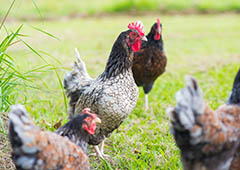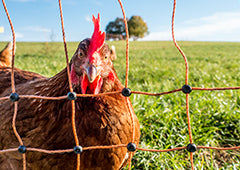There are limited areas in Australia that Quolls call home - meaning they may not be a threat to you and your chickens. They are however a threatened species, having now been classed as extinct in Queensland. They do exist, and can be a threat to any unprotected flocks if you don’t take the right precautions and house your girls in a safe and secure coop.
What are they?
The Quoll is a small, carnivorous marsupial distinguished by the pattern of their fur and sharp-teeth. They prefer to be active at night time rather than during the day, and eat many small animals as part of their diet. They also have sharp, retractable claws, which allows them to easily climb trees and attack small animals such as birds. Small Quolls generally only have a lifespan of two years, with larger Quolls living to around 4-5 years of age.
Types of Quolls
There are different types of Quolls that exist in various places around Australia - all very limited with the majority in Tasmania.
-
Western Quoll: Only found in the bottom corner of Western Australia
-
Eastern Quoll: Tasmania only, is a protected species
-
Spotted tail quoll: Found on the East Coast of Australia (now extinct in Queensland)
-
Northern Quoll: Found in the top half of Australia, around the coast
Quolls can be found in both suburban and rural areas.
(Please note that Quolls are now regarded as extinct in Queensland)
How do they hunt?
The Quolls strongest attributes are their claws and teeth, which are their predominant weapons against their prey.
How are my chickens at risk?
The reason that chickens may be on the radar of your local Quoll is because of their accessibility (due to poor housing) and their lack of defensive ability (flight not fight).
How can I prevent my chickens from getting eaten!
If Quolls are a known problem in your area, you need to consider a strong secure foundation to stop them from digging up underneath the coop. There are a number of options, the best being a concrete slab, followed by digging a barrier around 30cms deep around the footprint of the coop which can be made from bricks, timber, concrete or wire mesh to stop them from digging through. The third option that has also proven successful is to use a strong gauge wire mesh floor across the entire base of the coop with a 20-30cm perimeter.
In addition to this, there are a number of other effective options you can add to deter Quolls, such as:
-
A predator sensor light, that flashes on and scares the predator when it detects outside moment.
-
An automatic chicken coop door opener & closer to ensure your chooks are safe and sound inside the coop with a closed door after the sun goes down.
-
Electric poultry fencing is a strong deterrent to all predators, including quolls.
First and foremost, a strong and secure coop is the best precaution. Our coops have been designed to give your chickens the up most security by providing a lockable interior built from solid timber so any predator would have to work extremely hard just to get into the coop run, let alone the hutch.
Quoll Distribution Map
Other important information
Quolls are officially classified as a protected species, as they are becoming extinct. Therefore if you see one, no matter how annoyed or upset you may be, do not attempt to harm this animal as you may find yourself in a lot of trouble. If Quolls are in your area contact your local council.
This may sound daunting but don’t stress - plenty of backyard chicken owners living in Quoll territory have their flocks last to a ripe old age. If you feel like you could be a bit more prepared, try a Predator Sensor Light, or Wire Mesh Flooring.
From snakes and quolls to foxes and rats, who wants the stress and upset of having predators lurking around their flock family? No one wants to spend their time guarding a coop from intruders.
If you're in need of the best advice and information to keep your flock safe, it's your clucky day! Our friends at Chickenpedia have created a fantastic Poultry Predator Protection course. Sleep soundly knowing your chickens are safe from predators. Discover ways to keep intruders out of your coop, learn how to identify predators, and become the ultimate security eggspert.
Protect your flock today- check out Chickenpedia and their brilliant courses. I highly recommend their beginner-friendly, well-structured courses to all my readers!



















